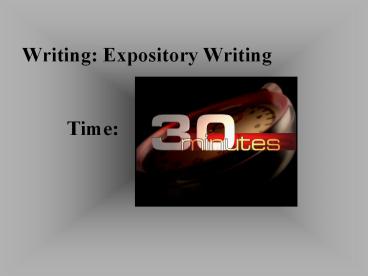Writing: Expository Writing Time: - PowerPoint PPT Presentation
Title:
Writing: Expository Writing Time:
Description:
Writing: Expository Writing Time: Task: Students will read a quote, adage or universally accessible topic and respond in an educated, thought-provoking essay. ??? – PowerPoint PPT presentation
Number of Views:1643
Avg rating:3.0/5.0
Title: Writing: Expository Writing Time:
1
Writing Expository WritingTime
2
Task Students will read a quote, adage or
universally accessible topic and respond in an
educated, thought-provoking essay.
3
Early to bed, early to rise
Harder, better faster, stronger
To be or not to be
Types of Prompts Quotes- famous
quotations by historians, authors, politicians,
etc. Example Do not be too timid and squeamish
about your actions. All life is an
experiment. Adages- short, memorable
sayings that have great meaning attached.
Example Life is ten percent what happens to you
and ninety percent how you react to it.
Universally Accessible Topic- Food for thought
that is not attached to curriculum or studies,
but rather an idea formed from life experience.
Example Some say that love is the most powerful
emotion. Others think love is simply a reaction.
???Can your imagination reach its full potential
on this picture???
4
TIPS FOR THE EXPOSITORY WRITING
- Aim for a 4-paragraph response (at a minimum)
which uses various cohesive devices (think-
transitions!). - Remember that this is all expository
(explanatory) not narrative (telling a story). - You will need an opening and a closing a
well-developed, cohesive, single focus
organization and logical progression - You will also need at least two well-developed
examples, using vivid details, that directly
relate to the prompt. - Write in 3rd person.
5
Be familiar with common wording
You will see the same set of directions embedded
in each prompt Using an example from
literature, history, science, film, or your own
experience or observation, write an essay
analyzing
6
Introduction
- Grab the readers attention
- Integrate the quote, adage or topic
- Find background information to introduce the
topic - Thesis statement or main idea
7
Example(s) from literature, history, science,
film You can actually study for this part,
because themes are UNIVERSAL Think about some
major novels that you have read thus far and/or
some historical figures. Figure out what they
stand for, what themes they exemplify, and be
ready to work that into whatever prompt presents
itself.
Body Paragraph
8
Body Paragraph
Example(s) from your own experience or
observation You will write this as an
explanation, not a narration. Do not be tempted
to relive the story speak about it with an
academic voice.
9
Conclusion
Generate final remarks without introducing brand
new examples Unify and Summarize your
ideas Remind the audience of your main point /
thesis Use a satisfactory close / clincher (could
tie back into intro)































